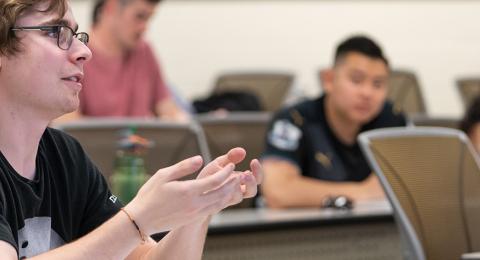What is political science?
Political science gives you the conceptual tools to understand pressing questions in today’s world. Why is American politics so partisan? How do we grapple with systemic inequality and racism? Why do some countries democratize and others stay locked in authoritarianism? In the political science minor program at UNH, you will study power, institutions and policy making at the local, national and global levels. From local grassroots movements to interstate wars, political action and institutions affect our societies and our everyday lives. As a minor, you will study the institutions, practices and ideas that shape international, comparative and American politics.
Why study political science at UNH?
Our faculty research and teach across a wide range of topics in international and comparative politics, American politics, political theory and public administration. New Hampshire’s status as the first-in-the-nation presidential primary state makes UNH an ideal place to study political science, whether at the local or national level. In addition, you will have opportunities to participate in internships through the Concord Internship in New Hampshire’s capital or the Washington Center Internship in Washington, D.C. You can work at the UNH Survey Center and join competitive student activities such as Model UN and UNH Mock Trial.
Potential careers
- Business executive
- Civil Servant
- Counterintelligence officer
- Diplomat
- Human rights advocate
- Journalist
- Lawyer
- Nonprofit organization director
- Political strategist
- Politician
- Public relations specialist
- Think tank researcher
Curriculum & Requirements
The study of government and politics, to which the courses and seminars of the Department of Political Science are devoted, includes the development of knowledge of political behavior by individuals and groups as well as knowledge about governments: their nature and functions; their problems and behaviors; and their interactions across all levels of governance.
Much of the learning offered by the Department of Political Science can also be regarded as essential for good citizenship, since political knowledge helps to explain the formal and informal institutions by which we are governed and the forces which lead to policy decisions, and also seeks to clarify the issues and principles that encourage people toward political involvement. In addition, such learning is especially valuable to students planning to enter local or national government or other public service, including the Foreign Service, and it will be of great help to those who intend to study law and enter the legal profession.
Students that would like to transfer credits from abroad or other universities should meet with our political science advisor, Heather Austin, to determine eligibility toward the minor.
- Academic policies related to Minors.
- The Political Science minor consists of completing five courses (20 credits).
- These courses may be taken in any combination of the five subfields and levels (400-700) offered. The fields to choose from are: American politics, political thought, comparative politics, international politics and methods.
- A minimum grade of C- or better is required in coursework towards the minor.
Required Courses
| Code | Title | Credits |
|---|---|---|
| Five elective POLT courses, with no more than two at the 400 level | 20 | |
| Total Credits | 20 | |



